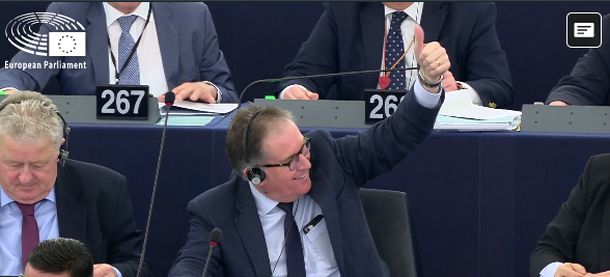
A Moroccan vessel carrying out controversial marine research, paid for by the European Union, is again spotted in the waters of occupied Western Sahara.
Illustration above is from Marinetraffic.com
On 21 May 2021, the Charif Al Idrissi (IMO: 8516706, Moroccan flag) crossed the maritime border between Morocco and the territory it holds under military occupation. The vessel made its way further down south, and is currently active in the area between Boujdour and Dakhla - home to some of northwest Africa's most lucrative fish stocks.
Under the EU-Morocco Sustainable Fisheries Agreement (SFPA), which entered into force in July 2019, Morocco grants EU vessels fishing licences in return for financial compensation. Most EU fishing however occurs in occupied Western Sahara - in spite of rulings by the EU Court of Justice annulling the agreement's application to the waters of the territory as it is separate and distinct from Morocco, and the latter has no sovereignty over or mandate to administer the territory. The EU's decision to continue with this practice without the consent of the people of the territory, is currently being reviewed by that same Court.
The deal's financial compensation includes an annual sum earmarked for developing Morocco's fishing sector. But as Western Sahara Resource Watch (WSRW) has unearthed, Morocco mostly uses this ‘sectoral support’ - with the express agreement of the EU Commission - to develop its fisheries sector in occupied Western Sahara.
For the first year of the SFPA, Morocco received €17,55 million in total sectoral support. That money was spent on several projects, including one referred to as “scientific exploration campaigns at sea”. In its reporting to the EU Commission, the Moroccan authorities described the particular research project as consisting of halieutic, oceanographic and bathymetric surveys, carried out by two research vessels: Charif Al Idrissi and Al Amir Moulay Abdellah (IMO number 9242510).
Neither the EU-Moroccan fisheries agreement nor the Moroccan marine research in the occupied waters are carried out with the consent of the Frente Polisario as the representative body of the Saharawi people - a requirement set by the EU Court of Justice in its 2016 ruling, cancelling the EU-Morocco trade agreement in occupied Western Sahara.
WSRW has observed both research vessels undertaking extensive research along the coast of occupied Western Sahara from the very north to the very south during 2019 and 2020. On some occasions, the vessels also docked at port. Charif Al Idrissi's reported calls during that period can be downloaded here and Al Amir Moulay Abdellah's calls can be downloaded here.
For the entire surveying project, the EU will pay Morocco a total of €3,69 million, of which €660,000 was already paid during the first operative year of the agreement (mid-July 2019 to October 2020, adding three months due to COVID-19). Seven campaigns have been undertaken in that first year aboard the Charif Al Idrissi and the Al Amir Moulay Abdellah.
By comparison, the European Commission has adopted guidelines preventing EU funding to the Israeli settlements in occupied Palestine, to ensure that the EU does not contribute to the entrenchment of Israel’s annexation policy.
The 2019 EU-Morocco SFPA is currently reviewed by EU Courts. The ruling should be delivered during the summer.
Commission under fire over Morocco fisheries agreement, 2006
EU Observer, 9 March 2006.
Hans Corell criticizes EU fisheries in Western Sahara
The former Legal Counsel to the UN Security Counsel, Mr. Hans Corell, comments on the EU's fisheries activities in Western Sahara.
EU Court reaffirms position on Western Sahara
Polisario has a case, but it should be pursued when the time is right, Court implies.
European Parliament disregards Court and adopts Morocco fish deal
Notwithstanding four consecutive rulings of the EU's highest Court calling such a practice illegal, the European Parliament has just now voted in favour of the EU-Morocco Fisheries Agreement that will be applied to the waters of occupied Western Sahara.

